formerly eScholarship Editions


|
|
|
|
Your search for
'Autobiographies and Biographies' in subject
found 60 book(s). | Modify Search | Displaying 1 - 20 of 60 book(s) | |
| 1. | 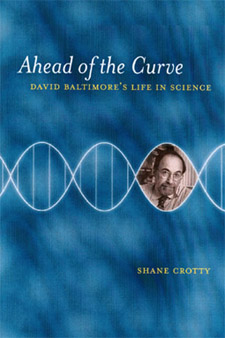 | Title: Ahead of the curve: David Baltimore's life in science Author: Crotty, Shane 1974- Published: University of California Press, 2001 Subjects: Autobiographies and Biographies | History of Science | Science Publisher's Description: Shane Crotty's biography of David Baltimore details the life and work of one of the most brilliant, powerful, and controversial scientists of our time. Although only in his early sixties, Baltimore has made major discoveries in molecular biology, established the prestigious Whitehead Institute at MIT, been president of Rockefeller University, won the Nobel Prize, and been vilified by detractors in one of the most scandalous and protracted investigations of scientific fraud ever. He is now president of Caltech and a leader in the search for an AIDS vaccine. Crotty not only tells the compelling story of this larger-than-life figure, he also treats the reader to a lucid account of the amazing revolution that has occurred in biology during the past forty years. Basing his narrative on many personal interviews, Crotty recounts the milestones of Baltimore's career: completing his Ph.D. at Rockefeller University in eighteen months, participating in the anti - Vietnam War movement, winning a Nobel Prize at age thirty-seven for the codiscovery of reverse transcriptase, and co-organizing the recombinant DNA/genetic engineering moratorium. Along the way, readers learn what viruses are and what they do, what cancer is and how it happens, the complexities of the AIDS problem, how genetic engineering works, and why making a vaccine is a complicated process. And, as Crotty considers Baltimore's public life, he retells the famous scientific fraud saga and Baltimore's vindication after a decade of character assassination. Crotty possesses the alchemical skill of converting technical scientific history into entertaining prose as he conveys Baltimore's huge ambitions, intensity, scientific genius, attitude toward science and politics, and Baltimore's own view about what happened in the "Baltimore Affair." Ahead of the Curve shows why with his complex personality, keen involvement in public issues, and wide-ranging interests David Baltimore has not only shaped the face of American science as we know it today, but has also become a presence in our culture. [brief] Similar Items |
| 2. | 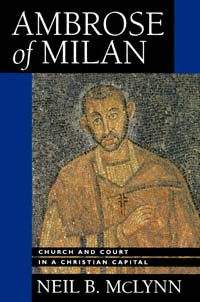 | Title: Ambrose of Milan: church and court in a Christian capital Author: McLynn, Neil 1960- Published: University of California Press, 1994 Subjects: Classics | History | Classical Religions | Christianity | Ancient History | Autobiographies and Biographies Publisher's Description: In this new and illuminating interpretation of Ambrose, bishop of Milan from 374 to 397, Neil McLynn thoroughly sifts the evidence surrounding this very difficult personality. The result is a richly detailed interpretation of Ambrose's actions and writings that penetrates the bishop's painstaking presentation of self. McLynn succeeds in revealing Ambrose's manipulation of events without making him too Machiavellian. Having synthesized the vast complex of scholarship available on the late fourth century, McLynn also presents an impressive study of the politics and history of the Christian church and the Roman Empire in that period.Admirably and logically organized, the book traces the chronology of Ambrose's public activity and reconstructs important events in the fourth century. McLynn's zesty, lucid prose gives the reader a clear understanding of the complexities of Ambrose's life and career and of late Roman government. [brief] Similar Items |
| 3. | 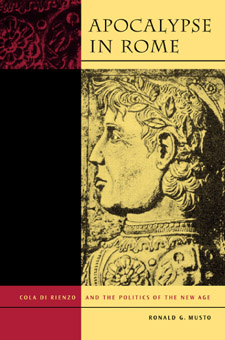 | Title: Apocalypse in Rome: Cola di Rienzo and the politics of the New Age Author: Musto, Ronald G Published: University of California Press, 2003 Subjects: History | European Studies | Medieval History | Medieval Studies | Autobiographies and Biographies | Classical Politics | Autobiographies and Biographies Publisher's Description: On May 20, 1347, Cola di Rienzo overthrew without violence the turbulent rule of Rome's barons and the absentee popes. A young visionary and the best political speaker of his time, Cola promised Rome a return to its former greatness. Ronald G. Musto's vivid biography of this charismatic leader - whose exploits have enlivened the work of poets, composers, and dramatists, as well as historians - peels away centuries of interpretation to reveal the realities of fourteenth-century Italy and to offer a comprehensive account of Cola's rise and fall. A man of modest origins, Cola gained a reputation as a talented professional with an unparalleled knowledge of Rome's classical remains. After earning the respect and friendship of Petrarch and the sponsorship of Pope Clement VI, Cola won the affections and loyalties of all classes of Romans. His buono stato established the reputation of Rome as the heralded New Jerusalem of the Apocalypse and quickly made the city a potent diplomatic and religious center that challenged the authority - and power - of both pope and emperor. At the height of Cola's rule, a conspiracy of pope and barons forced him to flee the city and live for years as a fugitive until he was betrayed and taken to Avignon to stand trial as a heretic. Musto relates the dramatic story of Cola's subsequent exoneration and return to central Italy as an agent of the new pope. But only weeks after he reestablished his government, he was slain by the Romans atop the Capitoline hill. In his exploration, Musto examines every known document pertaining to Cola's life, including papal, private, and diplomatic correspondence rarely used by earlier historians. With his intimate knowledge of historical Rome - its streets and ruins, its churches and palaces, from the busy Tiber riverfront to the lost splendor of the Capitoline - he brings a cinematic flair to this fascinating historical narrative. [brief] Similar Items |
| 4. | 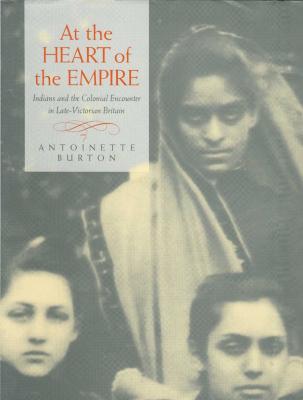 | Title: At the heart of the Empire: Indians and the colonial encounter in late-Victorian Britain Author: Burton, Antoinette M 1961- Published: University of California Press, 1998 Subjects: History | Women's Studies | Autobiographies and Biographies | South Asia | Victorian History | Travel | European History | Asian History Publisher's Description: Antoinette Burton focuses on the experiences of three Victorian travelers in Britain to illustrate how "Englishness" was made and remade in relation to imperialism. The accounts left by these three sojourners - all prominent, educated Indians - represent complex, critical ethnographies of "native" metropolitan society and offer revealing glimpses of what it was like to be a colonial subject in fin-de-siècle Britain. Burton's innovative interpretation of the travelers' testimonies shatters the myth of Britain's insularity from its own construction of empire and shows that it was instead a terrain open to continual contest and refiguration.Burton's three subjects felt the influence of imperial power keenly during even the most everyday encounters in Britain. Pandita Ramabai arrived in London in 1883 seeking a medical education and left in 1886, having resisted the Anglican Church's attempts to make her an evangelical missionary. Cornelia Sorabji went to Oxford to study law and became the first Indian woman to be called to the Bar. Behramji Malabari sought help for his Indian reform projects in England, and subjected London to colonial scrutiny in the process. Their experiences form the basis of this wide-ranging, clearly written, and imaginative investigation of diasporic movement in the colonial metropolis. [brief] Similar Items |
| 5. | 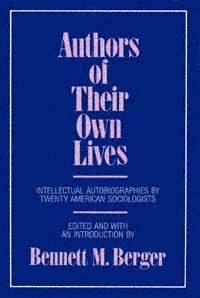 | Title: Authors of their own lives: intellectual autobiographies Author: Berger, Bennett M Published: University of California Press, 1990 Subjects: Sociology | Autobiographies and Biographies Publisher's Description: All students and scholars are curious about the human faces behind the impersonal rhetoric of academic disciplines. Here twenty of America's most prominent sociologists recount the intellectual and biographical events that shaped their careers. Family history, ethnicity, fear, private animosities, extraordinary determination, and sometimes plain good fortune are among the many forces that combine to mold the individual talents presented in Authors of Their Own Lives . With contributions from women and men, young and old, native-born Americans and immigrants, quantitative scholars and qualitative ones, this book provides a fascinating source for students and professional sociologists alike.Some of the autobiographies maintain their reserve, others are profoundly revealing. Their subjects range from childhood, educational, and intellectual influences, to academic careerism and burnout, to the history of American sociology. Authors stands alone as a deeply personal autobiographical account of contemporary sociology. [brief] Similar Items |
| 6. | 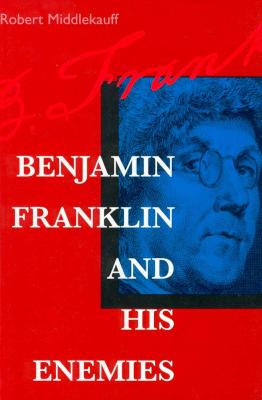 | Title: Benjamin Franklin and his enemies Author: Middlekauff, Robert Published: University of California Press, 1996 Subjects: History | United States History | Autobiographies and Biographies | American Studies Publisher's Description: In this engaging study of the much-loved statesman and polymath, Robert Middlekauff uncovers a little-known aspect of Benjamin Franklin's personality - his passionate anger. He reveals a fully human Franklin who led a remarkable life but nonetheless had his share of hostile relationships - political adversaries like the Penns, John Adams, and Arthur Lee - and great disappointments - the most significant being his son, William, who sided with the British. Utilizing an abundance of archival sources, Middlekauff weaves episodes in Franklin's emotional life into key moments in colonial and Revolutionary history. The result is a highly readable narrative that illuminates how historical passions can torment even the most rational and benevolent of men. [brief] Similar Items |
| 7. | 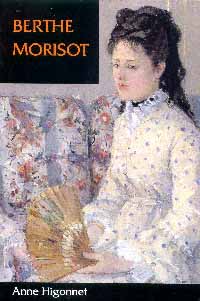 | Title: Berthe Morisot Author: Higonnet, Anne 1959- Published: University of California Press, 1995 Subjects: Art | Art History | Autobiographies and Biographies | Women's Studies Publisher's Description: Of the six Impressionist painters whose first exhibition scandalized and fascinated Paris in 1874, Berthe Morisot was the only woman. She reached a pinnacle of artistic achievement despite the restraints society placed on her sex, adroitly combining her artistic ambitions with a rewarding family lif . . . [more] Similar Items |
| 8. | 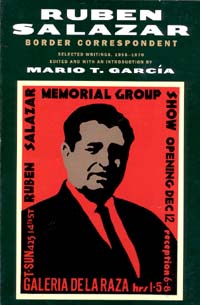 | Title: Border correspondent: selected writings, 1955-1970 Author: Salazar, Ruben 1928- Published: University of California Press, 1995 Subjects: Ethnic Studies | Latino Studies | Autobiographies and Biographies | United States History | Media Studies | American Studies Publisher's Description: This first major collection of former Los Angeles Times reporter and columnist Ruben Salazar's writings, is a testament to his pioneering role in the Mexican American community, in journalism, and in the evolution of race relations in the U.S. Taken together, the articles serve as a documentary history of the Chicano Movement of the 1960s and of the changing perspective of the nation as a whole.Since his tragic death while covering the massive Chicano antiwar moratorium in Los Angeles on August 29, 1970, Ruben Salazar has become a legend in the Chicano community. As a reporter and later as a columnist for the Los Angeles Times , Salazar was the first journalist of Mexican American background to cross over into the mainstream English-language press. He wrote extensively on the Mexican American community and served as a foreign correspondent in Latin America and Vietnam. This first major collection of Salazar's writing is a testament to his pioneering role in the Mexican American community, in journalism, and in the evolution of race relations in the United States. Taken together, the articles serve as a documentary history of the Chicano Movement of the 1960s and of the changing perspective of the nation as a whole. Border Correspondent presents selections from each period of Salazar's career. The stories and columns document a growing frustration with the Kennedy administration, a young César Chávez beginning to organize farm workers, the Vietnam War, and conflict between police and community in East Los Angeles. One of the first to take investigative journalism into the streets and jails, Salazar's first-hand accounts of his experiences with drug users and police, ordinary people and criminals, make compelling reading.Mario García's introduction provides a biographical sketch of Salazar and situates him in the context of American journalism and Chicano history. [brief] Similar Items |
| 9. | 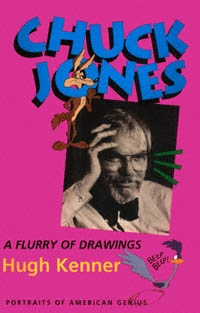 | Title: Chuck Jones: a flurry of drawings Author: Kenner, Hugh Published: University of California Press, 1994 Subjects: American Studies | Film | Autobiographies and Biographies Publisher's Description: Creator of the mono-maniacal Wile E. Coyote and his elusive prey, the Road Runner, Chuck Jones has won three Academy Awards and been responsible for many classics of animation featuring Bugs Bunny, Daffy Duck, Porky Pig, and Elmer Fudd. Who better to do Chuck Jones than Hugh Kenner, master wordsmith and technophile, a man especially qualified to illuminate the form of literacy that Jones so wonderfully executes in the art of character animation? A Flurry of Drawings reveals in cartoon-like sequences the irrepressible humor and profound reflection that have shaped Chuck Jones's work. Unlike Walt Disney, Jones and his fellow animators at Warner Brothers were not interested in cartoons that mimicked reality. They pursued instead the reality of the imagination, the Toon world where believability is more important than realism and movement is the ultimate aesthetic arbiter. Kenner offers both a fascinating explanation of cartoon culture and a new understanding of art's relationship to technology, criticism, freedom, and imagination. [brief] Similar Items |
| 10. | 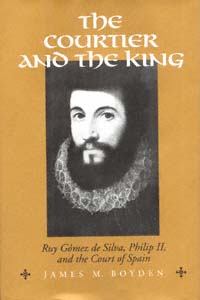 | Title: The courtier and the King: Ruy Gómez de Silva, Philip II, and the court of Spain Author: Boyden, James M 1954- Published: University of California Press, 1995 Subjects: History | European History | Autobiographies and Biographies Publisher's Description: Ruy Gómez de Silva, or the prince of Eboli, was one of the central figures at the court of Spain in the sixteenth century. Thanks to his oily affability, social grace, and an uncanny knack for anticipating and catering to the desires of his prince, he rose from obscurity to become the favorite and chief minister of Philip II.From the scattered surviving sources James Boyden weaves a vivid, compelling narrative: one that breathes life not only into Ruy Gómez, but into the court, the era, and the enigmatic character of Phillip II as well. Elegantly written and highly readable, this book discovers in the career of Gómez the techniques, aspirations, and mentality of an accomplished courtier in the age of Castiglione. [brief] Similar Items |
| 11. | 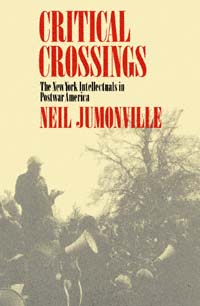 | Title: Critical crossings: the New York intellectuals in postwar America Author: Jumonville, Neil Published: University of California Press, 1990 Subjects: History | Autobiographies and Biographies | Sociology | Politics | American Studies Publisher's Description: The period immediately following the Second World War was a time, observed Randall Jarrell, when many American writers looked to the art of criticism as the representative act of the intellectual. Rethinking this interval in our culture, Neil Jumonville focuses on the group of writers and thinkers who founded, edited, and wrote for some of the most influential magazines in the country, including Partisan Review , Politics , Commentary , and Dissent . In their rejection of ideological, visionary, and romantic outlooks, reviewers and essayists such as Sidney Hook, Irving Howe, Lionel Trilling, Harold Rosenberg, and Daniel Bell adopted a pragmatic criticism that had a profound influence on the American intellectual community. By placing pragmatism at the center of intellectual activity, the New York Critics crossed from large belief systems to more tentative answers in the hope of redefining the proper function of the intellectual in the new postwar world.Because members of the New York group always valued being intellectuals more than being political leftists, they adopted a cultural elitism that opposed mass culture. Ready to combat any form of absolutist thought, they found themselves pitted against a series of antagonists, from the 1930s to the present, whom they considered insufficiently rational and analytical to be good intellectuals: the Communists and their sympathizers, the Beat writers, and the New Left. Jumonville tells the story of some of the paradoxes and dilemmas that confront all intellectuals. In this sense the book is as much about what it means to be an intellectual as it is about a specific group of thinkers. [brief] Similar Items |
| 12. | 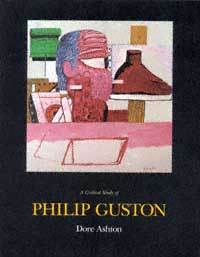 | Title: A critical study of Philip Guston Author: Ashton, Dore Published: University of California Press, 1990 Subjects: Art | Art History | Art Criticism | Autobiographies and Biographies Publisher's Description: Dore Ashton has updated the bibliography and added a new concluding chapter to her classic study of the paintings and drawings of Philip Guston, the only study of his work completely authorized by the artist.Philip Guston (1913-1980) was one of the most independent of the painters whose work was loosely linked by the term "abstract expressionism" during the 1950s, and he baffled admirers of his lushly beautiful abstract expressionist paintings by moving abruptly in mid-career to gritty figurative paintings in an almost cartoon-like style. One of the few critics who saw this at the time as a progressive development in his work was Dore Ashton, who here analyzes Guston's paintings and drawings in the context of the cultural milieu in which he worked, illuminating the dilemma facing artists who try to live with, understand, and express both the ideals of art and the reality of the world. [brief] Similar Items |
| 13. | 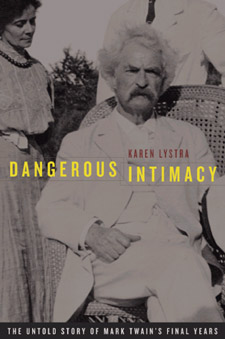 | Title: Dangerous intimacy: the untold story of Mark Twain's final years Author: Lystra, Karen Published: University of California Press, 2004 Subjects: Literature | Autobiographies and Biographies | Twain | American Literature | American Studies Publisher's Description: The last phase of Mark Twain's life is sadly familiar: Crippled by losses and tragedies, America's greatest humorist sank into a deep and bitter depression. It is also wrong. This book recovers Twain's final years as they really were - lived in the shadow of deception and prejudice, but also in the light of the author's unflagging energy and enthusiasm. Dangerous Intimacy relates the story of how, shortly after his wife's death in 1904, Twain basked in the attentions of Isabel Lyon, his flirtatious - and calculating - secretary. Lyon desperately wanted to marry her boss, who was almost thirty years her senior. She managed to exile Twain's youngest daughter, Jean, who had epilepsy. With the help of Twain's assistant, Ralph Ashcroft, who fraudulently acquired power of attorney over the author's finances, Lyon nearly succeeded in assuming complete control over Twain's life and estate. Fortunately, Twain recognized the plot being woven around him just in time. So rife with twists and turns as to defy belief, the story nonetheless comes to undeniable, vibrant life in the letters and diaries of those who witnessed it firsthand: Katy the housekeeper, Jean, Lyon, and others whose own distinctive, perceptive, often amusing voices take us straight into the heart of the Clemens household. Just as Twain extricated himself from the lies, prejudice, and self-delusion that almost turned him into an American Lear, so Karen Lystra liberates the author's last decade from a century of popular misunderstanding. In this gripping book we at last see how, late in life, this American icon discovered a deep kinship with his youngest child and continued to explore the precarious balance of love and pain that is one of the trademarks of his work. [brief] Similar Items |
| 14. | 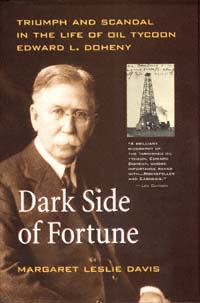 | Title: Dark side of fortune: triumph and scandal in the life of oil tycoon Edward L. Doheny Author: Davis, Margaret L Published: University of California Press, 1998 Subjects: History | California and the West | American Studies | Cultural Anthropology | Autobiographies and Biographies Publisher's Description: Dark Side of Fortune contains all the elements of a Hollywood thriller. Filling in one of the most important gaps in the history of the American West, Margaret Leslie Davis's riveting biography follows Edward L. Doheny's fascinating story from his days as an itinerant prospector in the dangerous jungles of Mexico, where he built the $100-million oil empire that ushered in the new era of petroleum. But it was a tale that ended in tragedy, when - at the peak of his economic power - Doheny was embroiled in the notorious Teapot Dome scandal and charged with bribing the U.S. Secretary of the Interior.Few captains of industry have matched Doheny's drive to succeed and his far-reaching ambition. Drawn to the West in search of fortune, he failed at prospecting before finding oil in a smelly, tar-befouled lot in Los Angeles in 1892. Certain that the substance had commercial value, he envisioned steamships and locomotives no longer powered by coal, but by oil. After developing massive oil wells in Mexico, Doheny built an international oil empire that made him one of the wealthiest men in the world. But in 1924 the scandal of Teapot Dome engulfed him. As accusations mounted, he hired America's top legal talent for his defense. During the ten-year-long litigation, Doheny's only son was mysteriously murdered by a family confidant. The government's case against Doheny ended in an astounding jury decision: The cabinet official accused of taking a bribe from Doheny was found guilty and sent to prison, yet Doheny was fully acquitted. Despite the verdict, the scandal had overshadowed the achievements of a lifetime, and he died in disgrace in 1935.Margaret Leslie Davis recreates the legal drama and adds details of behind-the-scenes strategy gleaned from the personal diaries and archives of Doheny's famed defense attorneys. Previously hidden personal correspondence adds to this first complete portrait of the man and answers questions about Doheny that have eluded historians for almost seventy-five years. [brief] Similar Items |
| 15. | 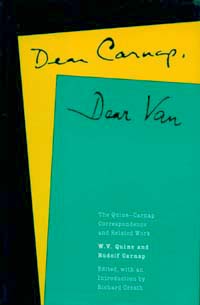 | Title: Dear Carnap, dear Van: the Quine-Carnap correspondence and related work Author: Carnap, Rudolf 1891-1970 Published: University of California Press, 1991 Subjects: Philosophy | History and Philosophy of Science | Autobiographies and Biographies Publisher's Description: Rudolf Carnap and W. V. Quine, two of the twentieth century's most important philosophers, corresponded at length - and over a long period of time - on matters personal, professional, and philosophical. Their friendship encompassed issues and disagreements that go to the heart of contemporary philosophic discussions. Carnap (1891-1970) was a founder and leader of the logical positivist school. The younger Quine (1908-) began as his staunch admirer but diverged from him increasingly over questions in the analysis of meaning and the justification of belief. That they remained close, relishing their differences through years of correspondence, shows their stature both as thinkers and as friends. The letters are presented here, in full, for the first time.The substantial introduction by Richard Creath offers a lively overview of Carnap's and Quine's careers and backgrounds, allowing the nonspecialist to see their writings in historical and intellectual perspective. Creath also provides a judicious analysis of the philosophical divide between them, showing how deep the issues cut into the discipline, and how to a large extent they remain unresolved. Dear Carnap, I enclose a copy of a paper which I am ready to send off for publication. . . . I am anxious to have you look this over as soon as possible, to see whether you have reason to suppose the system contradictory: for it looks dangerous. Dear Quine: I read your paper very carefully and with the highest interest. . . . So far, I do not see any contradiction in the system itself . . . but I share your feeling that the whole looks rather dangerous. [brief] Similar Items |
| 16. | 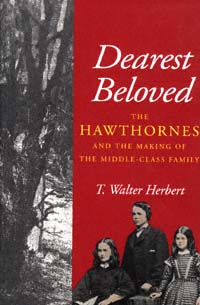 | Title: Dearest beloved: the Hawthornes and the making of the middle-class family Author: Herbert, T. Walter (Thomas Walter) 1938- Published: University of California Press, 1993 Subjects: Literature | American Literature | Literary Theory and Criticism | Women's Studies | Men and Masculinity | Autobiographies and Biographies | American Studies | United States History Publisher's Description: The marriage of Nathaniel and Sophia Hawthorne - for their contemporaries a model of true love and married happiness - was also a scene of revulsion and combat. T. Walter Herbert reveals the tragic conflicts beneath the Hawthorne's ideal of domestic fulfillment and shows how their marriage reflected the tensions within nineteenth-century society. In so doing, he sheds new light on Hawthorne's fiction, with its obsessive themes of guilt and grief, balked feminism and homosexual seduction, adultery, patricide, and incest. [brief] Similar Items |
| 17. | 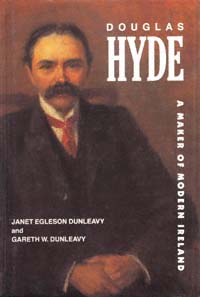 | Title: Douglas Hyde: a maker of modern Ireland Author: Dunleavy, Janet Egleson Published: University of California Press, 1991 Subjects: Literature | Autobiographies and Biographies | European History Publisher's Description: In 1938, at an age when most men are long retired, Douglas Hyde (1860-1949) was elected first president of modern Ireland. The unanimous choice of delegates from all political factions, he was no stranger to public life or to fame. Until now, however, there has been no full-scale biography of this important historical and literary figure.Known as a tireless nationalist, Hyde attracted attention on both sides of the Atlantic from a very early age. He was hailed by Yeats as a source of the Irish Literary Renaissance; earned international recognition for his contributions to the theory and methodology of folklore; joined Lady Gregory, W. B. Yeats, George Moore, and Edward Martyn in shaping an Irish theater; and as president of the Gaelic League worked for twenty-two years on behalf of Irish Ireland.Yet in spite of these and other accomplishments Hyde remained an enigmatic figure throughout his life. Why did he become an Irish nationalist? Why were his two terms as Irish Free State senator so curiously passive? Why, when he had threatened it earlier, did he oppose the use of physical force in 1916? How did he nevertheless retain the support of his countrymen and the trust and friendship of such a man as Eamon de Valera? Douglas Hyde: A Maker of Modern Ireland dispels for the first time the myths and misinformation that have obscured the private life of this extraordinary scholar and statesman. [brief] Similar Items |
| 18. | 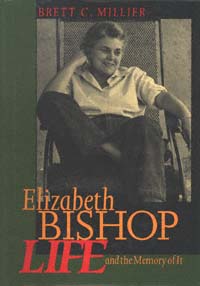 | Title: Elizabeth Bishop: life and the memory of it Author: Millier, Brett Candlish Published: University of California Press, 1992 Subjects: Literature | Autobiographies and Biographies | American Literature | American Studies | Literary Theory and Criticism | United States History | Women's Studies | Poetry Similar Items |
| 19. | 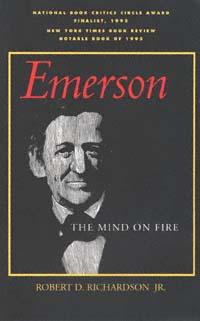 | Title: Emerson: the mind on fire: a biography Author: Richardson, Robert D 1934- Published: University of California Press, 1995 Subjects: Literature | American Studies | Autobiographies and Biographies | Social and Political Thought | United States History Publisher's Description: Ralph Waldo Emerson is one of the most important figures in the history of American thought, religion, and literature. The vitality of his writings and the unsettling power of his example continue to influence us more than a hundred years after his death. Now Robert D. Richardson Jr. brings to life an Emerson very different from the old stereotype of the passionless Sage of Concord. Drawing on a vast amount of new material, including correspondence among the Emerson brothers, Richardson gives us a rewarding intellectual biography that is also a portrait of the whole man.These pages present a young suitor, a grief-stricken widower, an affectionate father, and a man with an abiding genius for friendship. The great spokesman for individualism and self-reliance turns out to have been a good neighbor, an activist citizen, a loyal brother. Here is an Emerson who knew how to laugh, who was self-doubting as well as self-reliant, and who became the greatest intellectual adventurer of his age.Richardson has, as much as possible, let Emerson speak for himself through his published works, his many journals and notebooks, his letters, his reported conversations. This is not merely a study of Emerson's writing and his influence on others; it is Emerson's life as he experienced it. We see the failed minister, the struggling writer, the political reformer, the poetic liberator.The Emerson of this book not only influenced Thoreau, Fuller, Whitman, Dickinson, and Frost, he also inspired Nietzsche, William James, Baudelaire, Marcel Proust, Virginia Woolf, and Jorge Luis Borges. Emerson's timeliness is persistent and striking: his insistence that literature and science are not separate cultures, his emphasis on the worth of every individual, his respect for nature.Richardson gives careful attention to the enormous range of Emerson's readings - from Persian poets to George Sand - and to his many friendships and personal encounters - from Mary Moody Emerson to the Cherokee chiefs in Boston - evoking both the man and the times in which he lived. Throughout this book, Emerson's unquenchable vitality reaches across the decades, and his hold on us endures. [brief] Similar Items |
| 20. | 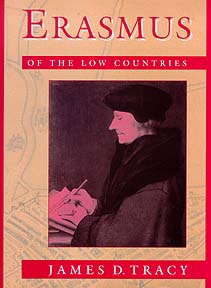 | Title: Erasmus of the Low Countries Author: Tracy, James D Published: University of California Press, 1997 Subjects: History | European History | Autobiographies and Biographies | Renaissance History Publisher's Description: Few historical figures have been more important in modeling the ideal of impartial critical scholarship than Erasmus of Rotterdam (1469-1536). Yet his critical scholarship, though beholden to no one, was not dispassionate. James Tracy shows how Erasmus the scholar sought through his writings to promote the moral and religious renewal of Christian society.Tracy finds the genesis of the humanist's notion of a "Christian republic" of pious and learned individuals in his "Burgundian," or Low Countries, roots. Erasmus's vision of reform, Tracy argues, sprung from a humanist tradition focusing on the importance of teaching ( doctrina ), a tradition from which Erasmus departed in his optimism about human nature and his deep suspicion of the powers that be. Amid the storms of Reformation controversy, he pruned back the "dissimulation" by which he had thought to convey different meanings to different readers, yet in the end he could not control the way his words were read. If Erasmus's scholarly ideal carries an enduring fascination, so too does his dilemma as a man of circumspection who would also be a reformer. [brief] Similar Items |